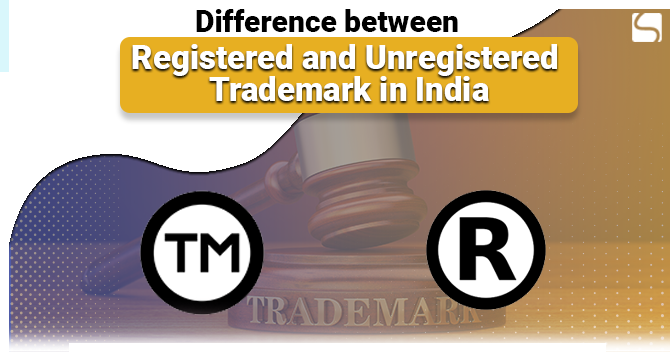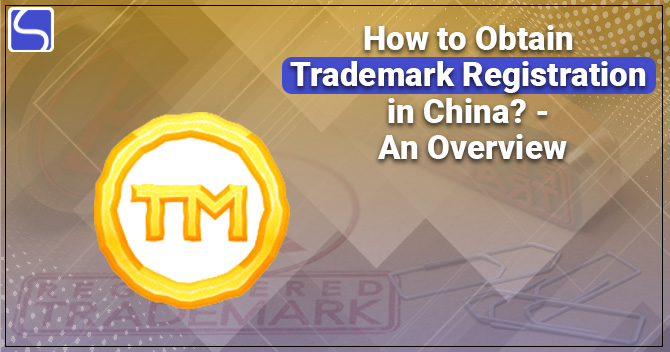Difference between Registered and Unregistered Trademark in India

Japsanjam Kaur Wadhera | Updated: Jan 23, 2021 | Category: Trademark
Trademark is a unique mark such as word, symbol, logo, name etc that is used to distinguish goods of one person or company from the others. One of the important factors that play a major role in giving an advantage to a firm is a trademark. A brand name helps a company to attract the customers in the market and sell goods. Therefore, Trademark holds a great value for a business. There are two categories of the trademark which is known as a registered trademark and unregistered trademark. This article will talk about the difference between registered and unregistered trademark in India.
Table of Contents
Understanding Registered Trademark
A registered trademark is a mark that has undergone the complete trademark registration procedure and is registered with the trademark registry. Many benefits and rights are given to the trademark holder when a trademark is registered under the Indian Trademark Act, 1999. It is necessary for a company or person applying for a Trademark registration to prove that his mark has a unique identity which can be easily distinguished from the other marks in the market. It is always recommended to register a trademark in India so as to avail the benefits associated with it. A registered trademark is an intangible asset which can be sold, leased or assign to any person by the trademark holder.
A registered trademark holder is given legal protection under the trademark laws and has a right to sue the infringer from infringement of his registered mark and can claim damages from such person for using the mark without his approval or consent. Once a trademark is registered symbol ® is used by the owner of the registered mark.
Registration of a trademark plays a very important role in distinguishing, identifying and advertising the product.
Understanding Unregistered Trademark
An unregistered trademark is a mark which is not registered with the Trademarks Registry under the Trademarks act 1999[1]. The trademarks which are not registered are not protected by any statutory law in India but however, are protected under the common law. And the Common Law does not provide the right against infringement but still does provide the right to sue for passing off. The term “Passing Off” simply means the act or practice of conducting unfair practice or means and taking benefits from the goodwill of another business. The person whose mark is being used illegally has a burden to prove that the other person is using his mark illegally for selling the goods and services and deceiving the public at large.
The owner of the unregistered mark does not have the right to use the ® symbol and just have the right to use the (TM) Trademark symbol indicating that the trademark is not registered but can be distinguished from the other goods and services. Also, the unregistered mark is not protected under the Trademarks act and another person cannot be stopped from using the same mark. Therefore, it is not protected under trademark laws and the trademark holder has only common law rights.
Sometimes trademark is not registered as the proprietors do not file registration application due to ignorance of Intellectual Property laws. Because the registration procedure is lengthy and complex, many applications filed by the proprietor are still pending before the trademark registry and the trademark is yet to be considered as registered.
What is the difference between Registered and Unregistered Trademark in India?
Registered trademark gets many benefits, unlike unregistered trademark. The difference between registered and unregistered trademark in India is as follows:
|
Basis |
Registered Trademark |
Unregistered Trademark |
|
Legal Status |
Registered Trademark as the name suggests is registered under the Indian Trademarks Act, 1999. |
Unregistered Trademark is the mark which is not registered under the Indian Trademark Act, 1999. |
|
Burden of Proof |
Once a Trademark is registered, it itself becomes the proof of its validity. The registered owner has a right to show the certificate of registration as a proof that such mark exists in his name and is valid. |
Since, the mark is not registered under the Trademarks Act, the burden to proof the validity of the mark lies on the owner of the trademark. And such rights can only be protected by him if he has a good reputation in the market. |
|
Geographical Benefits |
A Registered Trademark is protected all over the country and not only in a specific area. Therefore, a trademark owner can prevent any person from using his mark all over the country. |
The unregistered mark holder has to prove the existence and using of his brand name in the areas where he wish to obtain the rights. |
|
Right to use the Symbol |
The applicant of the Trademark has the right to apply the TM mark for his brand once the trademark is applied, and when the registration is done the trademark holder can put the® symbol for his trademark and reserve the unique rights in his name. |
The proprietor can just use the symbol TM for his mark to indicate his right on his brand but however, he does not have right to put ® symbol for his mark.
|
|
Protection/ Remedies Available |
The registered Trademark holder has the statutory right to protect his mark. He has the legal right to sue the infringer for infringement of his registered trademark. |
The unregistered Trademark Holder does not have statutory rights but has the rights under common laws only. |
Conclusion
The Indian Trademark Act, 1999 provides protection and legal rights to only those trademarks which are registered under the trademark laws. Therefore, registered trademarks are more secured and protected unlike unregistered trademarks. Even though it is not mandatory to register a trademark, it is still advisable to register a mark in India. The Trademark registration safeguards the legal rights of the mark holder and guards it from any infringement or violation and the burden of proof does not lie upon the trademark holder. There is an obvious difference between registered and unregistered trademark in India. Registered Trademark creates a better reputation for a brand and protected throughout the country. It helps in the growth of the brand and commerce. Whereas unregistered Trademark holder has to take much more initiative to proof his mark and set a reputation for his brand in the market.
Therefore, to survive in the long run, a company or an individual must register its Trademark in accordance with the rules and regulation prescribed under the Trademarks Act, 1999.
Also, Read: How to Avoid Rejections of Trademark Registration?














